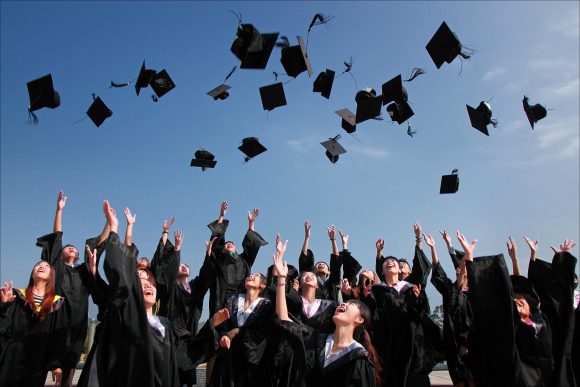
New graduates throw their caps in the air in celebration of graduating. (Pixabay / pexels.com)
The modern workforce is going through a revolution while academia has not kept up with the change. Future of work strategist Heather E. McGowan presented the challenges higher education faces when preparing students for the workforce in a talk titled “Future Forward: The future of work and learning and CU’s role in furthering the public good.”
McGowan explained in her speech that the world is currently in a fourth industrial revolution, where individuals and companies are increasingly adopting intelligence technology. She said she believes education will become a vital part of this technological revolution.
“We are going through the greatest velocity of change in human history,” McGowan said. “Work is being automated, atomized, and augmented.”
As society changes rapidly, McGowan explained, higher education needs to learn to adapt. Education needs to be constantly evolving to meet the new criteria. Everything about the workforce is changing, including the jobs within it. According to McGowan, over 65 percent of current jobs will be different by the time the next generation enters the workforce.
“We ask young people what they want to do when they grow up, but a lot of the jobs they may do do not exist yet,” McGowan said. “Why don’t we teach them to surf, not just step on the surfboard?”
The skills employers are looking for have also changed over time. Called “battleground skills,” they are some of the hardest to find. These include creativity, leadership, collaboration and adaptation. In the fourth quarter of 2018 sales, 75 percent of overall skills were not mentioned in previous reports.
“We are going through the greatest velocity of change in human history. Work is being automated, atomized, and augmented.”
Heather E. McGowan, business strategist
A key component of the fourth industrial revolution is technology. While technology is advancing, McGowan explained, it’s important to keep the human component evolving along with it. The new skills that are needed to enter the workforce coincide with technology.
“The more our economy is digitized, the more we need human skill,” McGowan said.
Higher education has done a good job in preparing students for the workforce in some areas, McGowan explained. They have the ability to bring people from a variety of backgrounds to have some knowledge when entering the workforce. When there are female board members in a business, they are overall more likely to experience an increase in net income.
“Diversity in teams allows you to check your blind spots,” McGowan said.
By having people with a diversity of perspectives businesses are able to understand and reach a broader range of audiences. This allows for their products to be easily used by a wide range of communities, cultures and groups in the world.
McGowan also mentioned the gender gap in the workforce. Men and women are raised with different societal expectations, yet enter the same workforce.
“We tell boys in primary school they’re good enough, but girls should exceed expectations,” McGowan said. “Yet in work, men are promoted for potential and women for accomplishments.”
The education system influences this gender gap by not having completely equal norms and expectations for children. Education has improved over time, but they still have a long way to go. This growth will come as society changes within the fourth industrial revolution.
“Humans right now are evolving,” said CU student and audience member Emma Bode. “I’m interested in the functions of how people are evaluated.”
Contact CU Independent Breaking News Editor Tory Lysik at tory.lysik@colorado.edu.
